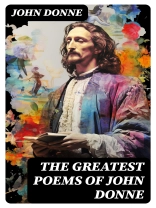In ‘The Greatest Poems of John Donne, ‘ readers are invited into the intricate and often tumultuous realm of love, faith, and mortality through the poet’s masterful use of metaphysical conceits and innovative imagery. This collection includes some of Donne’s most celebrated works, such as ‘The Flea’ and ‘Death Be Not Proud, ‘ where he deftly intertwines themes of desire and despair, crafting a unique literary style that challenges conventional poetic forms. Set against the backdrop of the late 16th and early 17th centuries, Donne’s work reflects the anxieties and complexities of the Elizabethan era, offering profound insights into the human condition that resonate through time. John Donne, a quintessential figure of the Metaphysical poets, was deeply influenced by his diverse experiences, from his time as a soldier to his later career as a priest. His rich educational background and engagement with both law and literature equipped him with a keen awareness of the philosophical and spiritual dilemmas of his time. This juxtaposition of intellectual rigor and emotional depth is evident in his poetry, reflecting a quest for truth in an increasingly fraught world. For readers seeking a profound exploration of the complexities of love and existence, ‘The Greatest Poems of John Donne’ is a must-read. This compilation not only displays Donne’s unparalleled ability to merge intellect with emotion but also invites contemporary readers to engage with enduring questions of faith, desire, and the passage of time.
Circa l’autore
John Donne (1572–1631), an English poet, satirist, lawyer and cleric, is best regarded for his metaphysical poetry, replete with wit, irony, and the use of paradox. Born into a Catholic family at a time when England was fraught with religious turbulence, Donne’s early years were marked by persecution and the loss of his father at age four. Nevertheless, he studied at both Oxford and Cambridge but never graduated due to his faith. Donne’s early works were noted for their erotic and sensual nature, exemplified in the collection ‘Songs and Sonnets’. However, after his marriage to Anne More and an eventual career change due to financial hardships – leading him from a Member of Parliament to an Anglican priest – his writing took on a more somber and pious tone. Donne’s later religious poems are considered among his finest and are well-represented in ‘The Greatest Poems of John Donne.’ A master of the metaphysical conceit, Donne’s poetry often draws intellectual comparisons between two seemingly dissimilar things. His meditative works reflect upon death, love, and the divine, showcasing his deep humanity and grappling with the existential. ‘Devotions upon Emergent Occasions’, written after a near-fatal illness, includes the meditation that contains the famous lines ‘No man is an island’ and ‘for whom the bell tolls’, indicating his profound understanding that human beings are intricately connected. Donne died in 1631 after a long illness, leaving behind a rich legacy that continues to influence modern poetry and literature.












